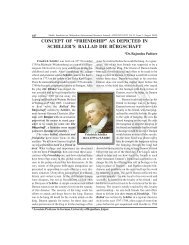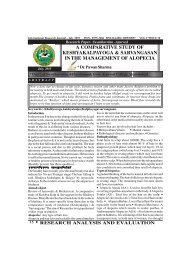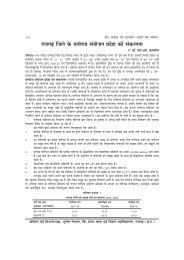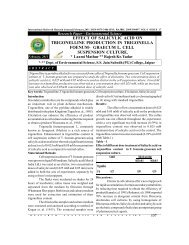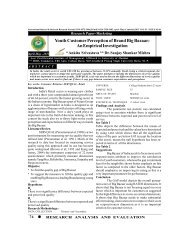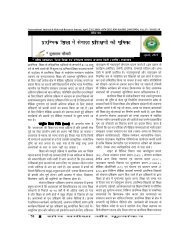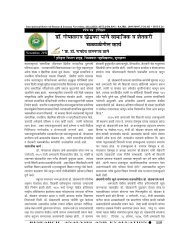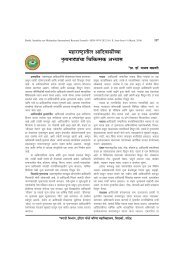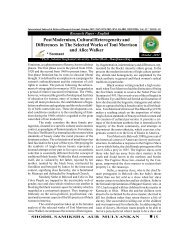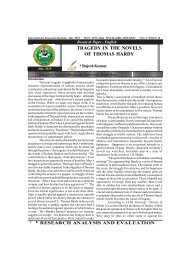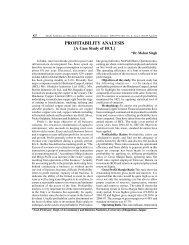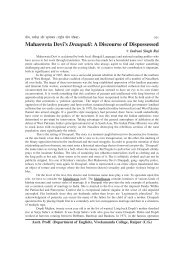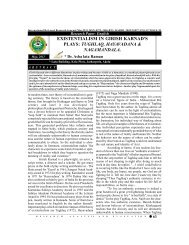intensive hunger for voluptuous love & freedom in kamala das poetry
intensive hunger for voluptuous love & freedom in kamala das poetry
intensive hunger for voluptuous love & freedom in kamala das poetry
You also want an ePaper? Increase the reach of your titles
YUMPU automatically turns print PDFs into web optimized ePapers that Google loves.
Research Paper—English<br />
INTENSIVE HUNGER FOR VOLUPTUOUS<br />
LOVE & FREEDOM IN KAMALA DAS POETRY<br />
* Dr. A. Ramesh Babu<br />
* Asst. Professor <strong>in</strong> English, KITS, Huzurabad, Andra Pradesh<br />
Postcolonial Indian English Poetry has been<br />
developed by the awe-<strong>in</strong>spir<strong>in</strong>g talent of Kamala<br />
Das. Her writ<strong>in</strong>gs absorb the cause of fem<strong>in</strong>ism. Kamala<br />
Das has a great personality which is the source of the<br />
strength of her <strong>poetry</strong>. Credited as the most outspoken<br />
and even controversial writer, Kamala Das earned<br />
fame as the ‘voice of women’s sexuality.’ (Rajdeep<br />
Pathak, 2009:1) She denigrated the tradition-bound,<br />
conservative society which was always harsh on her<br />
conventional life style. Love and sex are the leitmotif<br />
of her <strong>poetry</strong>. The article focuses on her quenchless<br />
quest <strong>for</strong> true <strong>love</strong> <strong>for</strong> women from the men. She has<br />
<strong><strong>in</strong>tensive</strong> <strong>hunger</strong> <strong>for</strong> <strong>voluptuous</strong> <strong>love</strong> and <strong>freedom</strong><br />
from her husband. The article seriously tries to<br />
mention how she ponders her feel<strong>in</strong>gs <strong>in</strong> her <strong>poetry</strong>.<br />
She searched <strong>for</strong> <strong>love</strong> and affection from her husband.<br />
She has def<strong>in</strong>ed the complexity of man- woman<br />
relationship, and its physical aspects. Her <strong>love</strong><br />
experience does not revolve round the traditional<br />
ideal of womanhood; <strong>in</strong>stead it revolves round the<br />
extra-marital sexual relationship which is unfulfilled<br />
and chaotic. As K.R.S. Iyengar po<strong>in</strong>ts out the subject<br />
of her <strong>poetry</strong>, “Love is crucified <strong>in</strong> sex, and sex defiles<br />
itself aga<strong>in</strong> and aga<strong>in</strong>.” (K.R.S. Iyengar, 1983: 677).<br />
As a poet of <strong>love</strong> and sex, Kamala Das looks most<br />
native, honest, and frank. She <strong>in</strong> her quest <strong>for</strong> <strong>freedom</strong><br />
and identity <strong>in</strong> her <strong>poetry</strong> “reflects the artistic identity.<br />
It reflects the artistic movement between utopia and<br />
authenticity.” (Seshadri, 1995: 124). She has frankly<br />
<strong>in</strong>terpreted <strong>love</strong> <strong>in</strong> terms of sex. She has emotions and<br />
the profuseness of deep feel<strong>in</strong>gs <strong>in</strong> her. Her poems<br />
show us her emotional temper, which makes her feel<br />
ill at ease with the present day materialistic world<br />
try<strong>in</strong>g to lay a siege around her. Dur<strong>in</strong>g her childhood,<br />
she was completely neglected. She tells <strong>in</strong> her<br />
autobiography, My Story:<br />
He (her father) was not of an affectionate<br />
nature. So we grew up more or less neglected and<br />
because we were aware of ourselves as neglected<br />
children <strong>in</strong> a social circle that pampered the young,<br />
the developed between us a strong relationship of<br />
<strong>love</strong>, the k<strong>in</strong>d a leper may feel <strong>for</strong> his mate who pushed<br />
him on a hand-cart when they went on their begg<strong>in</strong>g<br />
November, 2010<br />
rounds. (Kamala Das, 1976: 2) Kamala Das poems<br />
<strong>in</strong>clud<strong>in</strong>g her prose writ<strong>in</strong>gs give a wonderful picture<br />
about her marriage floundered on the rocks of ru<strong>in</strong><br />
right from the start. Her husband was very busy with<br />
his office works and he had no time to spend with<br />
Kamala Das, who used to hanker <strong>for</strong> a fulfillment <strong>in</strong><br />
<strong>love</strong>. He had earned <strong>for</strong> her security and money but<br />
that alone could not satisfy an extraord<strong>in</strong>ary woman.<br />
About her husband, she says:<br />
My husband was immersed <strong>in</strong> his office work, and<br />
after work was the d<strong>in</strong>ner followed by sex where was<br />
there any time left <strong>for</strong> him to want to see the sea or the<br />
dark buffaloes the slopes? (Kamala Das, 1975: 41)<br />
As a poet of <strong>love</strong> and sex, Kamala Das is hardly ever<br />
conventional or conservative. Summer <strong>in</strong> Calcutta<br />
has a fairly good number of poems on <strong>love</strong> and sex.<br />
Some of the poems are about the poetess pure <strong>love</strong>.<br />
She expresses her happ<strong>in</strong>ess and contentment <strong>in</strong><br />
<strong>love</strong>:<br />
Until I found you<br />
I write verse drew pictures,<br />
And, went out with friends<br />
For walks….<br />
Now that I <strong>love</strong> you,<br />
Curled like an old mongrel<br />
My life lies, content,<br />
In you…. (Kamla Das, 1965, 31)<br />
Most of the poems from her two volumes The<br />
Descendants and The Old Playhouse and other poems<br />
are filled with warmth and passion, with <strong>love</strong> and sex.<br />
In The Descendants, we have some poetic on the<br />
subject of <strong>love</strong> and lust as “A Request”, “Substitute”,<br />
“The Invitation”, “Captive” and “Convicts.” In her<br />
each poem, she po<strong>in</strong>ts out hard at her husband and<br />
wants to escape from him to get <strong>freedom</strong>. Her fem<strong>in</strong><strong>in</strong>e<br />
self f<strong>in</strong>ds the man emotionally deficient and <strong>in</strong>capable<br />
of possess<strong>in</strong>g a passionate regard <strong>for</strong> concrete reality.<br />
She says: It is not the physical <strong>love</strong> that Das longs<br />
<strong>for</strong>. What she craves <strong>for</strong> is an emotional bond<strong>in</strong>g with<br />
her man. But, to her surprise, she receives the carnal<br />
pleasures from him: That was the only k<strong>in</strong>d of <strong>love</strong>,<br />
(Kamla Das, 1967: 26) Kamla Das’ view of the world<br />
of reality is shaped by her own view that positive
male <strong>in</strong>difference <strong>in</strong> attribut<strong>in</strong>g to women a capacity<br />
<strong>for</strong> <strong>in</strong>dividualism is condemned <strong>in</strong> her poems of selfexploration.<br />
Her fem<strong>in</strong><strong>in</strong>e self is an example of the<br />
cruelty, tyranny and <strong>in</strong>different attitude of man. Like<br />
Tslima, Kamala Das subjected too much humiliation<br />
by her own husband as well as by other men. She<br />
loses her fem<strong>in</strong><strong>in</strong>e identity when she is <strong>for</strong>ced on to<br />
the bed aga<strong>in</strong>st her desires. One can easily says that<br />
<strong>love</strong> <strong>for</strong> her has become a mechanical affair and <strong>love</strong>rs<br />
a series of substitutes.Kamala Das says that she<br />
rema<strong>in</strong>ed a virg<strong>in</strong> <strong>for</strong> a <strong>for</strong>tnight after marriage is an<br />
example of triumph won by her poetic-self or ego-self<br />
over her fem<strong>in</strong><strong>in</strong>e self. A woman always longs <strong>for</strong> <strong>love</strong><br />
and this <strong>love</strong> can not be one sided. It should be<br />
mutual. But <strong>in</strong>stead of the juice of <strong>love</strong> Kamla Das<br />
f<strong>in</strong>ds an ‘empty cistern’ <strong>in</strong> her life. As Saleem Peerad<strong>in</strong>a<br />
has discoursed: She writes about <strong>love</strong> with the<br />
obsessive ness of a woman who can realize her be<strong>in</strong>g<br />
fully only through <strong>love</strong>. Not surpris<strong>in</strong>gly, given the<br />
subject, the writ<strong>in</strong>g is some-times week and self<strong>in</strong>dulgent.<br />
(Peerad<strong>in</strong>a Saleem, 1972: 86). I conclude<br />
that the <strong>in</strong>terest of Kamala Das’s <strong>poetry</strong> deals with<br />
not only about the story of sex outside marriage but<br />
also the <strong>in</strong>stability of her feel<strong>in</strong>gs. Her words <strong>in</strong> her<br />
<strong>poetry</strong> enact her quest, an exploration <strong>in</strong>to her self<br />
and seek<strong>in</strong>g of her identity. Her poems are situated<br />
neither <strong>in</strong> the act of sex nor <strong>in</strong> the feel<strong>in</strong>g of <strong>love</strong>, they<br />
are <strong>in</strong>stead ,<strong>in</strong>volved with the self and it is varied<br />
often conflict<strong>in</strong>g emotions rang<strong>in</strong>g from the desire<br />
<strong>for</strong> security and <strong>in</strong>timacy to the assertion of ego, selfdramatization<br />
and feel<strong>in</strong>g of shame and depression.<br />
R E F E R E N C E<br />
A.N. Dwivedi, Kamala Das and Her Poetry, New Delhi: Atlantic Publishers, 2000. Kamala Das, My Story, New Delhi: Sterl<strong>in</strong>g<br />
Publishers, 1988. Kamla Das, The Descendants, Calcutta writers work shop, 1967. Kamla Das, Summer <strong>in</strong> Calcutta, New<br />
Delhi: Everest Press, 1965.K.R.S. Iyengar, Indian Writ<strong>in</strong>g <strong>in</strong> English, New Delhi: Sterl<strong>in</strong>g Publishers, 1983. Om Prakash<br />
Dwivedi, “Quest <strong>for</strong> True Love <strong>in</strong> Kamala Das’s Poetry” Journal of Alternative Perspectives <strong>in</strong> the Social Sciences, 1:<br />
3 (2009): 943-950. Peerad<strong>in</strong>a Saleem, Contemporary Indian Poetry <strong>in</strong> English, Madras: Macmillian, 1972. Rajeshwar<br />
Mittapalli and Pier Paolo Piciucco, Kamla Das: A Critical Spectrum, New Delhi : Atlantic Publications, 2001. Rajdeep Pathak<br />
, Indian Writ<strong>in</strong>g <strong>in</strong> English and Kamala Das: A Tribute to the Writer and Poet http://www.boloji.com/literature/00143.htm<br />
Seshadri Vijaylakshmi, The New Woman <strong>in</strong> Indian–English to man cont<strong>in</strong>ues S<strong>in</strong>ce the 1970s. Delhi: B.R. Publish<strong>in</strong>g<br />
Corporation, 1995.



